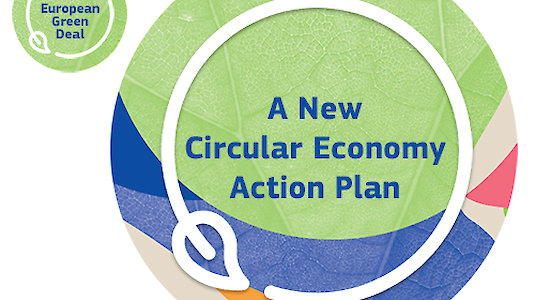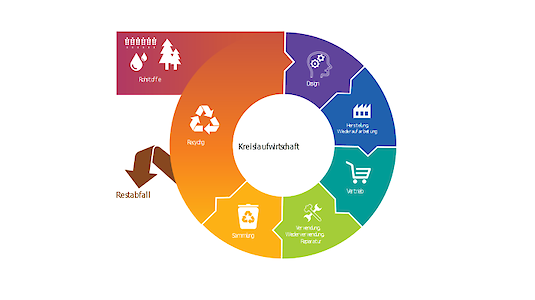Circular Economy in the European Union - A new strategy
The circular economy is the central element of the European Green Deal and is closely linked to the new strategic framework for industry and the small and medium-sized enterprise sector.
In March 2020, the European Commission presented the new circular economy action plan - for a cleaner and more competitive Europe. The environmental services sector is the central element of the European Green Deal and is also closely linked to the new strategic framework for the industrial and small and mediu-sized enterprise (SME) sector. With last year's European Green Deal, the European Commission is laying the building block for a transition to a circular economy and a climate-neutral Europe by 2050.
Why is a circular economy necessary?
At present, both the worldwide consumption of resources and materials and the global volume of waste are increasing at a rapid pace. The extraction and processing of resources causes high greenhouse gas emissions and enormous pressure on water and biodiversity. Achieving the EU's environmental and climate goals requires a circular economy. The Circular Economy Action Plan with its 35 key measures therefore creates a framework for sustainable production and changes in consumer behaviour, with digitalisation playing a key role.

Sustainable design is the standard
At present, many products break down quickly, cannot be reused, repaired, recycled or can only be used once. This is why the new action plan sets the course: Products should be designed with a long life period and service life, making them easier to reuse, repair and recycle, and containing the highest possible proportion of recycled materials rather than primary materials. The use of disposable products will be restricted. The destruction of unsold durable goods should be prohibited.
Smart use of resources and waste prevention is the key. The use of high-quality recycled materials should be further strengthened and well-functioning secondary raw materials markets should be established. The action plan contains further measures to minimise the export of waste from the EU and to combat illegal waste shipments.
Measures to strengthen consumer rights are also an important approach, such as reliable information on the durability and reparability of products or a right to repair.

Focus on resource-intensive industries
The EU Commission is primarily targeting particularly resource-intensive industries with high recycling potential, such as the electronics, plastics, textile and construction sectors. For example, the Commission intends to adopt new regulatory measures for mobile phones, tablets and laptops, which are intended to enable a longer life period and service life. An EU-wide take-back system for the return of old mobile phones, tablets and chargers is also being considered.
The plastics strategy will continue and focus on increasing the proportion of recycled plastics. Other priorities include microplastics and the procurement and use of bio-based and biodegradable plastics.
A new legal framework for batteries is to ensure that the sustainability and recycling potential of batteries is fully realised. In the construction and textile sectors, the Commission will propose new comprehensive strategies.
This year and next year further concrete and implementing measures will be worked out in order to actually implement a Europe-wide recycling economy.
